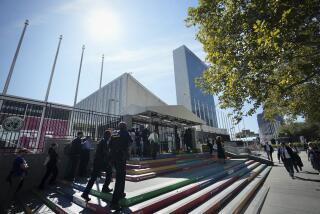Mandela Thanks U.N. for Apartheid Stance
- Share via
NEW YORK — Nelson Mandela, leader of the long-suppressed African National Congress, was given a rousing, historic welcome Friday to the United Nations, where he thanked the world body for its support in trying to abolish the “crime” of apartheid.
More than 2,000 spectators in the packed General Assembly Hall, many wearing their brightly colored native costumes, gave the deputy president of the ANC a standing ovation.
Mandela said apartheid “is a crime against humanity” and it is “appropriate that the international community should decide that it should be suppressed and punishment meted out against its perpetrators.”
“We pay tribute to this organization and its member states for this and other decisions and actions it took to expunge this crime,” he said.
Mandela’s whirlwind visit to New York moved into its third and final day with hardly a minute left unscheduled for the 71-year-old revolutionary. His undiminished and openhearted welcome from New Yorkers left cynical old-timers shaking their heads.
“My visit to New York has exceeded all my wildest expectations, from the response of the crowd and the response to requests that were made for resources to enable us to carry the program facing us,” he told reporters Friday.
Mandela hugged Secretary General Javier Perez de Cuellar when he stepped inside the U.N. headquarters. The two officials met privately for almost an hour.
Perez de Cuellar called Mandela the “most popular man in town.”
For more than a hour, Mandela listened closely to the outpouring of praise and the pledges of continued support for his cause against apartheid by speaker after speaker at the General Assembly.
Perez de Cuellar noted in his welcoming speech that South Africa’s repression of its black citizens strikes “at the very heart of the U.N. Charter.”
“It embraces uprooting of people from their homes, mass deportions, harsh repressions and unjust practice based solely on race and color,” he said.
“Despite violence inflicted on Nelson Mandela . . . . the messages he brings are peace and justice and the restoration of the inalienable rights of the people of South Africa,” he added.
In his speech, Mandela gave rare praise to the Pretoria government.
“We believe that President (Frederik W.) de Klerk and his colleagues in the leadership of the ruling party are people of integrity,” he said. “We are of the view that they will abide by decisions that are arrived at in the course of our discussions and negotiations.”
Mandela praised the General Assembly’s adoption last December of a declaration outlining steps to be taken to dismantle apartheid, including stepped-up economic sanctions on South Africa and financial assistance to southern African nations.
But, he added, the world community still has “some distance to travel” before the declaration would be implemented.
At a taping later of a PBS program, “Meeting With Mandela,” the ANC leader defended his support of Yasser Arafat, a stance that drew criticism from major Jewish groups in the city.
He said he was “more astonished than surprised” by the slew of headlines in the local press about comments Thursday in which he praised the PLO leader’s support of the ANC.
“To me, the only solution to the problem in the Middle East is peace and for the operatives to sit down and hammer out a solution,” Mandela said. “The only solution is an agreement between the PLO and Israel.”
Thursday night, Mandela took his campaign against apartheid to the heart of Harlem and drew a thunderous ovation from a crowd of thousands with the ringing cry, “Death to racism!”
From there he went to Yankee Stadium packed with about 55,000, where he donned a Yankee warm-up jacket and cap and proclaimed with a broad smile, “I am a Yankee!”
He was scheduled to head to Boston and Washington over the weekend in his eight-city U.S. tour.
Earlier Friday, Mandela met in a private session with business leaders in the towering World Trade Center.
It was not immediately known what Mandela told the group, but in an interview with the New York Times Thursday, he said the African National Congress was not wedded to socialism and supports “state participation” in the South African economy only to the extent needed “to redress gross disparities in wealth between blacks and whites.”
The statement was believed to be an effort by Mandela to ease worries about the ANC’s longstanding support for nationalization of important industries and over its alliance with the South African Communist Party.
More to Read
Sign up for Essential California
The most important California stories and recommendations in your inbox every morning.
You may occasionally receive promotional content from the Los Angeles Times.












